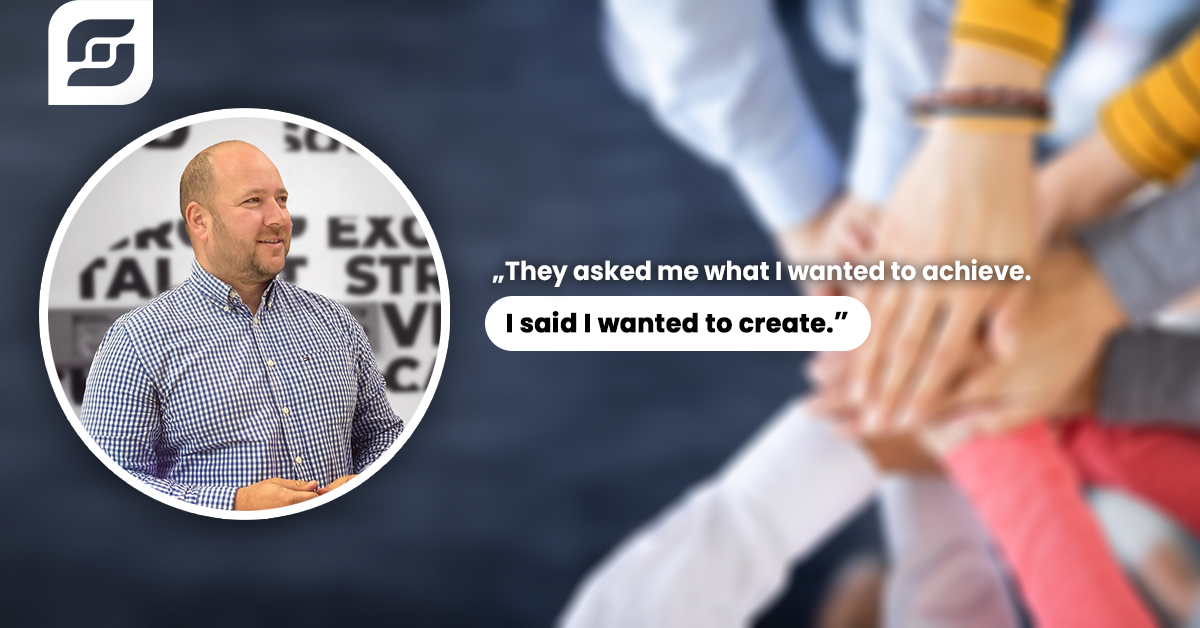In our interview with UCC's CEO (Chief Executive Officer), Zsolt Máté Juhász, we get an insight into the complex balance of leadership and everyday priorities. Zsolt shares his thoughts on the challenges and successes of running a company in the dynamic world of modern business.
The daily struggle to balance the interests of employees, partners, owners, and us. How can we maintain this balance, if possible?
Every day, we strive to maintain balance to allow individuals to flourish. We think the right person needs to be in the right place. We endeavor to find a suitable place for all our people in the organization, in roles that best suit their skills, knowledge, and experience.
We believe in understanding and looking after the best interests of the company, and as part of our UCC culture, we exercise healthy self-control to accept those factors over which we have no control. We are an organization working together to support each other on our journey.
Considering the global shift to remote work, what leadership techniques have you and your fellow leaders had to develop to maintain success?
It is not a specific method but rather requires more effort to build the connections that will keep our common boat sailing in the same direction. Reaching out to colleagues takes additional time, and from the outset, I observed that middle managers exerted more energy as virtual communication replaced casual interactions and lunches in the office. The method of tracking tasks remains unchanged, with the systems and tools still available for support. Three to four years ago, we received feedback indicating that managers found virtual motivation challenging. However, all our employees have now adapted to and embraced virtual workspaces, as evidenced by our latest satisfaction rating of 94.65%. It has become customary to have a team member behind the virtual machine and to foster mutual reliance.
Why UCC, for more than 10 years?
UCC enabled me to unleash the energy within me, so I would like to express my special thanks to my fellow director, Richárd Kozma, for believing in me during that time. I will always be grateful to him. When asked ten years ago about my aspirations, I expressed my desire to create, bring meaning to everyday life, and provide employment opportunities for many individuals. Despite not excelling academically in school, it was always a combination of common sense and a healthy instinct for life that fueled our growth with UCC year after year, supported by a highly collaborative and innovative environment.
The Top 100, Top 30, and Top 10 Best Companies to Work For studies are regularly published, covering pay, benefits, development opportunities, work-life balance, leadership, culture, and values. However, experience shows that the immediate leader is even more important. What are your thoughts on this?
I have read many studies like this, and based on my own experience, it is often true that people leave the leader and not the company. We have managed to create an environment where people feel safe, resulting in virtually no turnover at the management level, and we are very proud of that. Making mistakes is part of the learning process, and I strongly encourage my colleagues to try new things. In our journey of evolution, we often explore uncharted paths, viewing mistakes as opportunities for growth. The key lies in how we respond to a mistake and how we can leverage it for future advantage. Colleagues are encouraged and empowered to voice their opinions to their managers. Ultimately, the responsibility rests with me, but constructive questioning leads to progress. This culture has firmly rooted itself in our organization.
Over the past 10 years, you've been a true angler, discovering and nurturing gems and talents. It takes a good eye, that's for sure. Share with us the secret of how you spot hidden talent.
I believe I am more curious than the average person because I always focus on basic human values. Over the years, I have managed to assist some colleagues in their development curve, but I couldn't have done it without their collaboration. At UCC, we value each other and consider ourselves ordinary individuals with a responsibility to one another and the community. Therefore, I am delighted to support people who may not initially appear convincing and may not have opportunities elsewhere. We have numerous success stories of this nature.
Do you have one, and if so, what is your sacred and inviolable guiding principle in everyday life?
If we are talking about a guiding principle, it is the belief in competition and the pursuit of justice, which are certainly present in my everyday life. If we're talking about rules, it might seem strange, but I don't have any rules, so maybe it's just that I want to avoid patterns. One of my favorite sayings is about adaptability, which is perhaps the most important evolutionary virtue of humans. I don't want to be a creature of habit, and when it comes to business solutions, I avoid the "this is how we do it" answers and look for the unusual. I try to encourage this attitude in others.
Surely your failures will inevitably appear alongside your successes, they will fit in well. How do you deal with failure?
I think it is very relative to what we consider success and failure. I tend to take success for granted but I have learned valuable lessons from my failures. Over time, I have shifted my perspective to understand success as thoroughly as I do failure, becoming more aware of both. But outside of analysis, you shouldn't brood too much, because life evolves rapidly and you should always focus most of your energy on the way forward, besides, success today may become an expectation tomorrow, what is a failure today is an opportunity tomorrow. A chance to learn and grow. Professional sport is a good example of this mentality, there is a lot to learn from it and that is what I try to do.
Who inspires you to improve?
I think there is an inherent urge to conform, which can be described as intrinsic motivation. Such individuals find themselves torn between the desire to succeed and the fear of failure. I have never required specific motivation. I am naturally curious and can learn from everyone — our customers, colleagues, and company owners. I consider myself fortunate to be surrounded by great people.
Is there anything else you would like to share from your leadership experience? What is your message to future leaders?
I have always encouraged my colleagues to improve themselves, not because it is expected of them. Whatever we do, it builds us up, so we always must give it our all because sooner or later all that experience adds up and that is of great value. I've worked in quite a wide range of areas, and they've all been good for something. I've been able to learn from everything and that mentality still helps me today. If there's a message to be shared, try to understand the world around you and use technology in the context of digitalization and human capital, but don't underestimate people, those kinds of skills will be extremely valuable in the years, even decades, to come.

 Magyar
Magyar Deutsch
Deutsch Italiano
Italiano Español
Español Français
Français


